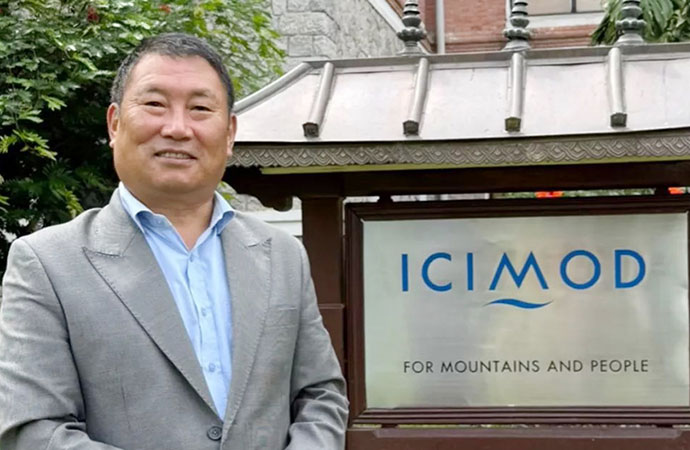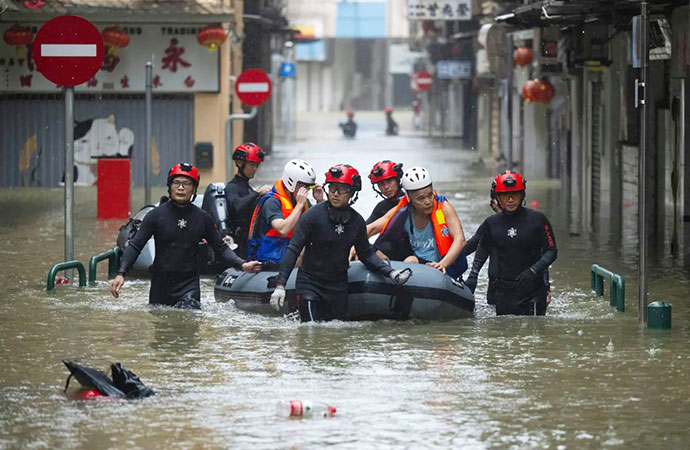Reportage

Dr Pema Gyamtsho. Photo: UNB
He says building trust, sharing scientific knowledge important as rivers connect people
Director General of the International Centre for Integrated Mountain Development (ICIMOD) Dr Pema Gyamtsho has laid emphasis on building trust and sharing scientific knowledge and evidence among countries in the region, stressing that rivers cross national boundaries and connect people.
"This is very important. Rivers cross national boundaries and rivers connect us. But very often, we do not recognise the connectivity that rivers bring. Rivers should be uniting us, not dividing us," he told UNB in an interview at the ICIMOD headquarters in Kathmandu recently.
Dr Pema, the first Director General from the region that ICIMOD serves since its establishment in 1983, said the first step is to build trust and the next step is to come up with scientific knowledge and evidence.
He highlighted the importance of sharing information on what is happening upstream, the kind of water flow regimes, how glacier melt affects river flows, or in the event of a potential glacial lake outburst and how that information can quickly reach downstream communities.
Dr Pema, who served the Royal Government of Bhutan for over three decades, said it is also important to know what kind of sedimentation is happening and what level of pollution is taking place.
Upstream-Downstream Data
"This upstream-downstream data is very relevant," he said, adding that everything has to be done step by step. "Overnight, we cannot reach a stage where everybody agrees. It has to be a process, a movement," said the DG.
He, however, said the ICIMOD provides the information, science and the decision-support systems. At the end of the day, Dr Pema said, it is up to the governments to come together, discuss and make decisions. "If they have the right evidence and intelligence, they will be better informed to make the right decisions."
Responding to a question, Dr Pema said they have been largely focused on the Chittagong Hill Tracts area because that represents the mountainous part of Bangladesh.
There, he said, they are looking at supporting the livelihood systems - how they can promote climate-resilient agricultural practices, how they can better manage water resources, especially in terms of addressing the shortage of water.
Dr Pema said Bangladesh faces serious challenges - sometimes there is too much water with floods; sometimes there is too little water with long periods of drought.
"So, during those periods, how can we manage production systems? We are also looking at reviving springs that have already dried up and preventing the drying up of springs that are still in good condition. Spring-shed management is one area we are really going to focus on," said the DG.
He said, "Of course, other areas are also important - for example, supporting the development of ecotourism. That is another area where we would like to focus."
Now, at the national level, Dr Pema said they are working with institutions like the Department of Meteorology and Hydrology to come up with more reliable forecasting systems and early warning systems.
Early Warning System
Responding to a question on early warning systems, Dr Pema said the early warning system that they are trying to promote is called Community-Based Flood Early Warning Systems (CBFEWS).
"Now, of course, ICIMOD itself cannot do all these things - we are working through partners in Bangladesh, including the Disaster Management Department," he said.
Dr Pema said it is not enough just to have the right prediction tools or early warning systems. "It is equally important to prepare communities: bringing them together, building their capacity, educating them, and preparing their response mechanisms."
He said that is something they really want to take forward, because at the end of the day, when a flood happens, it is the communities that have to respond.
"They need to be ready. This also means we must look at how to address the specific needs of more vulnerable groups, like people with disabilities, women, and children," Dr Pema observed.
In terms of funding, he said how these funds are being mobilised, and whether there is any funding gap that is a calculation they have made based on the National Adaptation Plans of countries.
For adaptation, Dr Pema said, it will indeed be a challenge, but they have to start somewhere. "We have to raise awareness about how much is needed, and identify the sources from which we can get this funding whether from global funding mechanisms or from within our own governments."
He said it is a multipronged approach and they try to link the scientific evidence with the potential sources of funding, so that there is an opportunity for funding agencies and the scientific community to come together, and see where support is most needed, where it could have the biggest impact.
Expectations from COP30
Asked about his expectations from the 30th United Nations Climate Change Conference, scheduled for November 10-21, 2025, in Belém, Brazil, the DG said, "I have always kept my expectations very modest."
"For me, the priority is for this region to come together and solve our own problems, our own challenges. Of course, we can raise our issues and challenges at the global level, but for that to translate into actions here takes time," he observed.
Dr Pema said the fastest way forward for them is for their own member countries to come together and take action now. "If you ask me frankly, my expectations are very modest."
On the issue of the Loss and Damage Fund, especially with the big players like the USA, who have not been very proactive in the deliberations so far, he said, it is indeed a challenge.
Dr Pema said loss and damage is going to be challenging and the discussions are still ongoing; definitions are still being refined; funding mechanisms are still being debated.
At this stage, he said, it is very difficult to say how effective this funding mechanism will be.
Current Priorities
Asked about the priorities for ICIMOD, Dr Pema said, the biggest priority is for the eight regional member countries - Afghanistan, Bangladesh, Bhutan, China, India, Myanmar, Nepal, and Pakistan - to come together and address the challenges they are facing.
"Every day we hear about disasters as a result of climate change. You hear about glacial lake outburst floods happening as a result of fast melting of glaciers; we are talking about cloudbursts and flash floods," he said.
Dr Pema said these disasters do not stop at their borders - from the upstream countries to the downstream countries, everybody needs to work together.
He said they are trying to bring these countries together to address these challenges, which require very reliable early warning systems and effective response measures. "So this is a top priority."
Of course, another priority is air pollution, Dr Pema said, adding that the whole region is suffering from very poor air quality.
"We are also trying to see how we can tackle air pollution across borders, because air pollution may originate in one place, but the impacts are felt everywhere," said the DG.
He said it does not stop in airspace or water; it just keeps moving. "So again, there is a need for all countries to come together and address it."
The third area they are focusing on is the management of national parks and protected areas, Dr Pema said.
He said biodiversity is very important for the people, and many communities depend on it for their livelihoods.
"So how can we improve the bio-economy? How can we improve conservation? How can we work together to protect iconic species like the wild yak, red panda, Asian elephant, or high-altitude snow leopard? These animals don't use passports; they don't apply for visas. We have to give them enough space to move around, which will also enhance their chances of survival," Dr Pema said, adding that these are some of the priority areas they are working on.
Political Support
Responding to a question, he said they are getting all the support from their member countries. Since ICIMOD is a politically neutral organisation, they are not a political body, he mentioned.
"We do not deal with politically sensitive issues. We are focused on science, environment, and science-based evidence. Our key role is facilitating the sharing of knowledge, experiences, and good practices from one country to another, and also learning from institutions outside the region and bringing that knowledge here to share with our member countries," he said.
"Now, as far as political support from all member countries is concerned, I would say we are receiving it. ICIMOD is jointly funded by our member countries as well as partners from outside the region. The funding itself is an indication of the kind of support we are receiving," Dr Pema mentioned.

























Leave a Comment
Recent Posts
Religion and Politics: A Toxic ...
At Dhaka University, cafeteria workers have been told not to wear shor ...
Enayetullah Khan joins AsiaNet ...
AsiaNet’s annual board meeting and forum was held in Singapore, ...
In a New York minute
Many leaders back a UN call to address challenges to ..
Defaulted loans at Non-Bank Financial Institutions ( ..
How the late Zubeen Garg embodied cultural affinitie ..